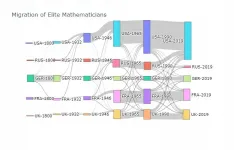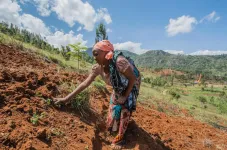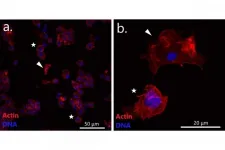(Press-News.org) Most businesses were ill-prepared to deal with the pandemic and muddled though the challenges stemming from it, according to a report published today.
Resilience reimagined: a practical guide for organisations was produced by Cranfield University, in partnership with the National Preparedness Commission (NPC) and Deloitte. The report presents insights from business leaders from a range of sectors and makes seven recommendations for organisations on how to become more resilient, drawing on lessons from past 12 months.
Cranfield University's Professor David Denyer and Mike Sutliff conducted in-depth interviews and four focus groups with more than 50 C-suite level people (boards, senior executives, policymakers, and resilience directors) from FTSE 100 companies, multi-nationals and major national infrastructure organisations, many of them household names.
The report warns we are entering a new period of uncertainty and change, with an ever-increasing possibility that things will go wrong. It sought answers from leading figures about how resilience can be developed, who does it well and what other businesses can learn from them.
It also outlines practical steps necessary to strengthen resilience for long-term success and makes recommendations to business leaders on what more they can do to help their organisations to develop the ability to cope.
Cranfield's research found that the organisations that coped best with the pandemic had already been doing the following three things:
They understood what was most important to their customers and therefore what were the most essential things to continue to deliver as the crisis unfolded.
If something went wrong, they knew what the thresholds of tolerable impacts to the customer/user were and had examined in advance alternative ways of delivering those outcomes that mattered the most.
They had relentlessly stress tested for possible disruption without worrying about what type of threat they might have to face - a cyberattack or a pandemic - learning how to cope when under pressure from challenges that might not be foreseeable or imaginable.
Professor David Denyer, Professor of Leadership and Organisational Change at Cranfield University, said: "We do not know what shape the next crisis will take but we can take proactive action to prepare.
"Businesses and organisations need to seize the learnings from this crisis and develop the agility to cope with the next. Whether it is another pandemic, another financial crisis or threats from a cyber attack or climate change, the risks are multiple and complex but the capabilities of readiness, responsiveness, recoverability and regeneration, the 4Rs, are ones that can be ingrained.
"One of the reasons the financial sector coped better than most during the pandemic was that it had taken on the lessons from the 2008 crash. By going through that crisis, these organisations had stress-tested, they knew their tolerances and what an acceptable level of failure was to them and their customers.
"Our research, in partnership with the National Preparedness Commission and Deloitte, gives organisations vital practical steps to reimagine the way they think about resilience and respond to future crises."
Lord Toby Harris, Chair of the National Preparedness Commission, said:
"The last year has been like no other for most business organisations, but some coped and responded much better than others. We asked Cranfield University to look at why this was and what the lessons are for the future.
The Government wants to build a whole-of-society approach to resilience, so that every business, every organisation and every individual can play their part in making sure that as a nation we can withstand any future crisis. This means changing organisational cultures to foster an active and agile response to events and this report highlights some of what is needed to make this a reality."
Rick Cudworth, Partner at Deloitte said:
"Dealing with complex events requires flexibility and creativity; dealing with future uncertainty requires the ability to change course and adapt rapidly. This report clearly shows that resilience is about much more than well-rehearsed plans. This is a fundamental change in thinking, which requires senior leaders to make strategic choices, balancing control, agility, efficiency and innovation. It is great to see leaders pointing to resilience being central to a new 'social contract' for responsible business.
"By adopting the seven practices in this report organisations will be able to build stronger resilience and be better positioned to thrive going forward."
INFORMATION:
As social media platforms like Instagram, Snapchat, TikTok and others continue to grow in popularity, adolescents are spending more of their time online navigating a complex virtual world.
New research suggests that these increased hours spent online may be associated with cyberbullying behaviors. According to a study by the University of Georgia, higher social media addiction scores, more hours spent online, and identifying as male significantly predicted cyberbullying perpetration in adolescents.
"There are some people who engage in cyberbullying online because of the anonymity and the fact that there's no retaliation," said Amanda Giordano, principal investigator of the study and associate professor in the UGA Mary Frances Early College of Education. "You have these ...
Math's top prize, the Fields Medal, has succeeded in making mathematics more inclusive but still rewards elitism, according to a Dartmouth study.
Published in Nature's END ...
Researchers at the Johns Hopkins Kimmel Cancer Center used machine learning techniques to detect mutational signatures in cancer patients. Their algorithm outperformed the current standard of analysis and revealed new mutational signatures associated with obesity, which is believed by cancer prevention experts to be becoming the most significant lifestyle factor contributing to cancer in the U.S. and most of the Western world.
The study was published in the Jan. 25 issue of the journal eLife.
"Mutational signatures are important in current cancer research as they enable you to see the signs left by underlying factors, such as aging, smoking, alcohol use, UV exposure, and BRCA inherited mutations that contribute to the development ...
Making people fear the coronavirus may motivate us to wash our hands, keep our distance and wear a face mask. But fear also takes a heavy toll on our mental health and is fertile ground for discrimination and prejudice. New research shows a different path.
When the coronavirus pandemic hit the world in the spring of 2020, feelings of being capable or efficacious against the virus were a key factor in driving compliance with the authorities' guidelines. This is the result of a new study based on large surveys across eight Western democracies, published in British Journal of Health Psychology.
The extent to which we personally felt informed and capable of acting clearly affected the extent of our behaviour to prevent infection, e.g. by keeping our distance ...
A team of researchers at the Technical University of Munich (TUM) has developed a new early warning system for vehicles that uses artificial intelligence to learn from thousands of real traffic situations. A study of the system was carried out in cooperation with the BMW Group. The results show that, if used in today's self-driving vehicles, it can warn seven seconds in advance against potentially critical situations that the cars cannot handle alone - with over 85% accuracy.
To make self-driving cars safe in the future, development efforts often rely on sophisticated models aimed at giving cars the ability to analyze the behavior of all traffic participants. But what happens if the models are not yet capable of handling some complex ...
Drinking beetroot juice promotes a mix of mouth bacteria associated with healthier blood vessels and brain function, according to a new study of people aged 70-80.
Beetroot - and other foods including lettuce, spinach and celery - are rich in inorganic nitrate, and many oral bacteria play a role in turning nitrate to nitric oxide, which helps to regulate blood vessels and neurotransmission (chemical messages in the brain).
Older people tend to have lower nitric oxide production, and this is associated with poorer vascular (blood vessel) and cognitive (brain) health.
In the new study, by the University of Exeter, 26 healthy older people took part in two ten-day supplementation periods: one with nitrate-rich ...
Increasing numbers of people in Belgium are turning away from meat in favour of plant-based alternatives, according to new research from psychologists at the University of Bath, in collaboration with Belgian animal welfare organisation GAIA.
New analysis finds that in 2020, over half of Belgians (51%) were 'satisfied' with meat alternatives - a figure that has increased from 44% since 2019.
The results of the research which gauged responses from a representative sample of 1,000 people in Belgium over two years (in 2019 and 2020) highlights concerns around animal agriculture and the environment that are impacting individuals' dietary choices.
Additional findings from ...
Computer scientists at the University of Surrey have created a ground-breaking model that could improve our understanding of developmental disorders such as autism.
Scientists have long tried to better understand how the cerebral cortex and its layers develop, with pathologies such as autism, schizophrenia and epilepsy linked to this process.
In a paper published by the journal Cerebral Cortex, scientists from Surrey, Newcastle University, and Nottingham University detail how they developed and used a computational model to simulate cell division, cell migration and apoptosis (cell death) in the hope of understanding how these processes affect the development of the brain.
With the help of their computer model, the ...
A study examining bean productivity among smallholder farmers in Tanzania, has found that on average, yields are 6% lower among female than male farmers. Women are often 'invisible' in agriculture, researchers say, due to social structural barriers and national agricultural policies, which do not address discriminatory land rights; education and agricultural information and decision making, which must be tackled to reverse this trend.
The paper 'What Does Gender Yield Gap Tell Us about Smallholder Farming in Developing Countries?' published in the open access scientific journal Multidisciplinary Digital Publishing (MDPI), analyzed data from southern region in Tanzania since 2016 and also drew on research ...
'A transmissible cancer was first discovered in dogs in the middle of the 19th century. It is transmitted sexually from a sick dog to a healthy one, the cancer cells themselves being the infective agent. In the 1990s, a contagious cancer was discovered in the Tasmanian devil. Since the cancer was found in only two species of mammals, scientists used to think that it is quite rare in the nature. However, time has come to reconsider this view. A transmissible cancer appears to be fairly widespread among bivalve molluscs,' says Maria Skazina, a research associate at the ...



